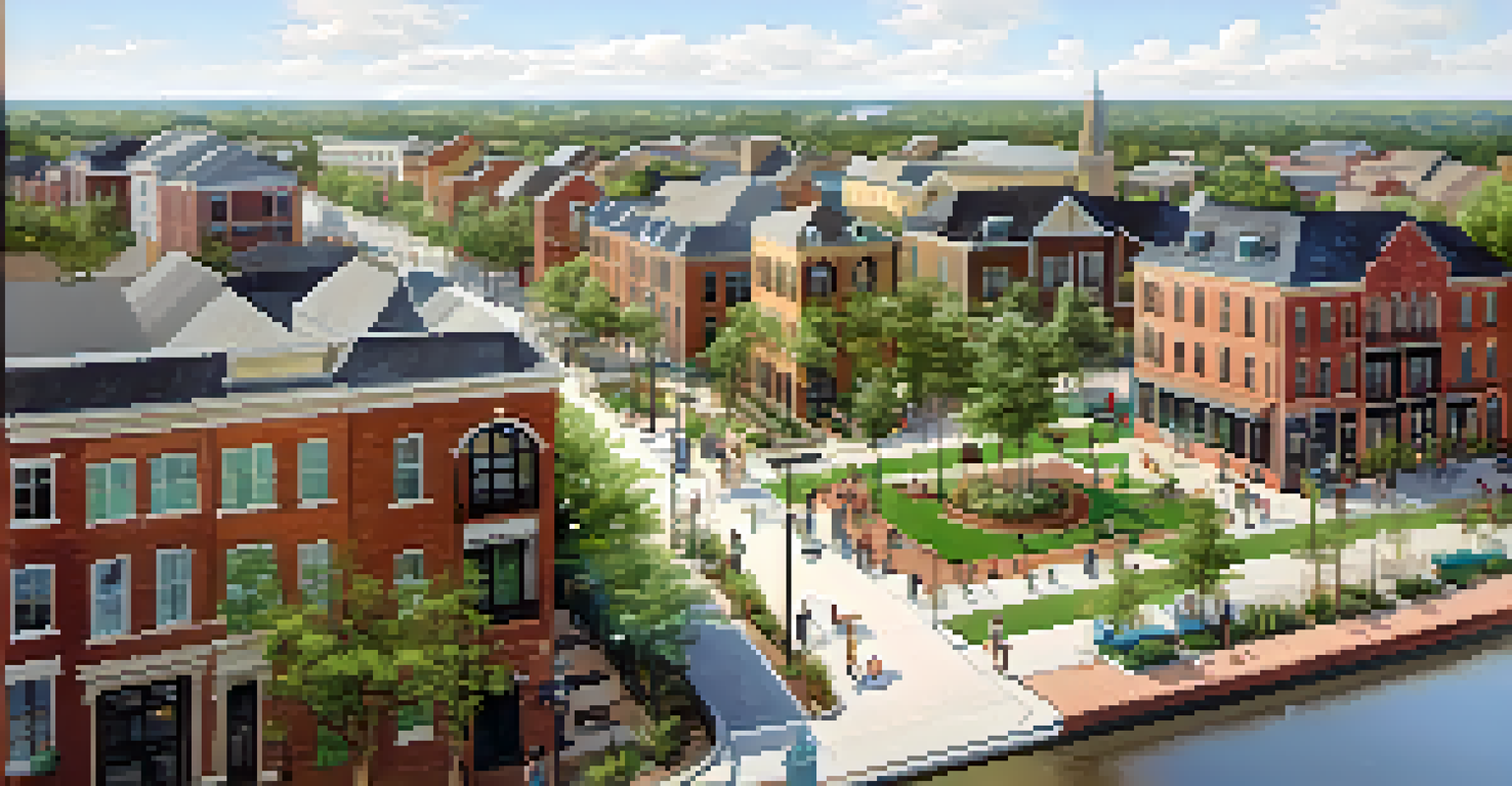Urban Development Projects Shaping Georgia's Economic Future

Overview of Urban Development in Georgia
Georgia is experiencing a significant wave of urban development projects that are reshaping its cities and towns. From Atlanta to Savannah, these initiatives aim not only to modernize infrastructure but also to enhance the quality of life for residents. With a focus on sustainability and innovation, urban development is becoming a cornerstone of Georgia's economic strategy.
Cities are the engines of innovation and economic growth, but they must also remain places of community and connection.
One key factor driving this transformation is the state's robust population growth, which creates an increasing demand for housing, transportation, and amenities. As more people move to Georgia, local governments are investing in projects that can accommodate this influx while also preserving the charm of their communities. This balance between growth and preservation is crucial for maintaining Georgia's unique identity.
Moreover, urban development projects are not just about buildings and roads; they are also about fostering community engagement and inclusivity. Many initiatives incorporate public spaces, parks, and cultural venues that encourage social interaction and community bonding. This holistic approach ensures that urban development benefits everyone, making Georgia a more attractive place to live and work.
Key Urban Development Projects in Georgia
Several noteworthy urban development projects are currently underway across Georgia, each contributing to the state's economic vitality. The Atlanta Beltline is a prime example, transforming an old railway corridor into a vibrant network of parks, trails, and transit options. This project not only enhances mobility but also stimulates local businesses and real estate development.

In Savannah, the Canal District revitalization aims to breathe new life into underutilized areas by creating mixed-use developments that blend residential, commercial, and recreational spaces. This initiative not only attracts tourists but also provides local residents with new opportunities for work and leisure. As the district evolves, it promises to become a cultural hub for both locals and visitors.
Urban Development Drives Growth
Ongoing urban development projects in Georgia are reshaping cities and boosting the economy through increased housing, amenities, and job creation.
Meanwhile, the City of Athens is focusing on enhancing its downtown area through a series of improvements aimed at increasing accessibility and foot traffic. By investing in pedestrian-friendly infrastructure, the city hopes to support local businesses and create a more inviting atmosphere. Such projects highlight how thoughtful urban planning can lead to economic benefits while enriching community life.
The Economic Impact of Urban Development
Urban development projects play a pivotal role in boosting Georgia's economy. By attracting new businesses and residents, these initiatives generate jobs and increase tax revenues, which can then be reinvested into the community. For instance, the expansion of public transit options not only provides easier access to employment but also stimulates growth in surrounding neighborhoods.
Sustainability is not just about the environment; it's about the community and the economy as well.
Furthermore, the development of mixed-use spaces encourages a vibrant local economy where shopping, dining, and entertainment thrive. This creates a symbiotic relationship between residents and businesses, leading to a robust economic ecosystem. As urban areas become more attractive, they draw in talent and investment, which further fuels economic growth.
Additionally, urban development projects often prioritize sustainability, which can lead to long-term cost savings for both municipalities and residents. Green building practices and energy-efficient infrastructure reduce utility costs and promote environmental responsibility. As Georgia continues to embrace these principles, it positions itself as a leader in sustainable urban development.
Sustainability in Urban Development
Sustainability has become a guiding principle in Georgia's urban development projects, reflecting a growing awareness of environmental issues. Developers are increasingly incorporating green building practices, such as energy-efficient designs and sustainable materials, to minimize their ecological footprint. This shift not only helps the environment but also appeals to eco-conscious residents and businesses.
Public transportation initiatives, like expanded bus and rail systems, are also central to sustainable urban development. By reducing reliance on personal vehicles, these projects aim to decrease traffic congestion and lower emissions. As more Georgians opt for public transit, the state can move towards a greener, more efficient transportation network.
Sustainability Is Key Focus
Sustainability principles guide urban development in Georgia, incorporating green practices and public transportation to create healthier communities.
Community green spaces, such as parks and urban gardens, are another facet of sustainability in urban development. These areas provide essential benefits, including improved air quality and recreational opportunities for residents. By prioritizing access to nature within urban settings, Georgia's development projects contribute to healthier, happier communities.
Community Engagement in Urban Development
Community engagement is a vital aspect of successful urban development in Georgia. Developers and city planners are increasingly seeking input from residents to ensure that projects meet local needs and preferences. This collaborative approach fosters a sense of ownership among community members, making them more likely to support and participate in the initiatives.
Public forums, surveys, and workshops are common methods used to gather community feedback. These platforms allow residents to voice their opinions on various aspects of development, from design elements to potential amenities. By actively involving the community in decision-making, developers can create spaces that truly reflect the desires of those who live there.
Moreover, community engagement helps to build trust between developers and residents. When people see that their input is valued and considered, they are more likely to embrace change. This positive relationship can lead to smoother project implementation and a greater sense of pride in the resulting developments.
Challenges Facing Urban Development in Georgia
While urban development projects present numerous opportunities, they also come with challenges that must be addressed. One significant issue is balancing growth with the preservation of historical and cultural landmarks. As cities expand, there is often pressure to replace old structures with new developments, which can lead to the loss of a community's unique character.
Additionally, funding can be a hurdle for many urban development projects. Securing financial support from both public and private sources is essential for bringing these initiatives to life. Economic fluctuations and budget constraints can complicate this process, necessitating innovative funding strategies and partnerships to ensure projects move forward.
Community Engagement Matters
Active community involvement in urban planning fosters a sense of ownership and ensures developments meet the needs of local residents.
Finally, ensuring that urban development benefits all segments of the population is a critical concern. Gentrification, where rising property values displace long-time residents, can create tension within communities. Addressing this issue requires careful planning and policies aimed at maintaining affordability while promoting growth.
The Future of Urban Development in Georgia
Looking ahead, the future of urban development in Georgia appears bright, with a continued focus on innovation and sustainability. As cities evolve, there will be an increasing emphasis on smart city technologies that enhance efficiency and quality of life. From traffic management systems to energy-efficient buildings, these advancements will help Georgia remain at the forefront of urban development.
Moreover, as the demand for affordable housing rises, developers are likely to explore creative solutions that balance growth with accessibility. This may include mixed-income housing projects and incentives for developers to include affordable units in new developments. Such approaches can help ensure that all residents benefit from Georgia's economic growth.

Ultimately, the success of urban development in Georgia will depend on collaboration between governments, developers, and communities. By working together, they can create vibrant, inclusive urban environments that drive economic growth while enhancing the quality of life for all Georgians.